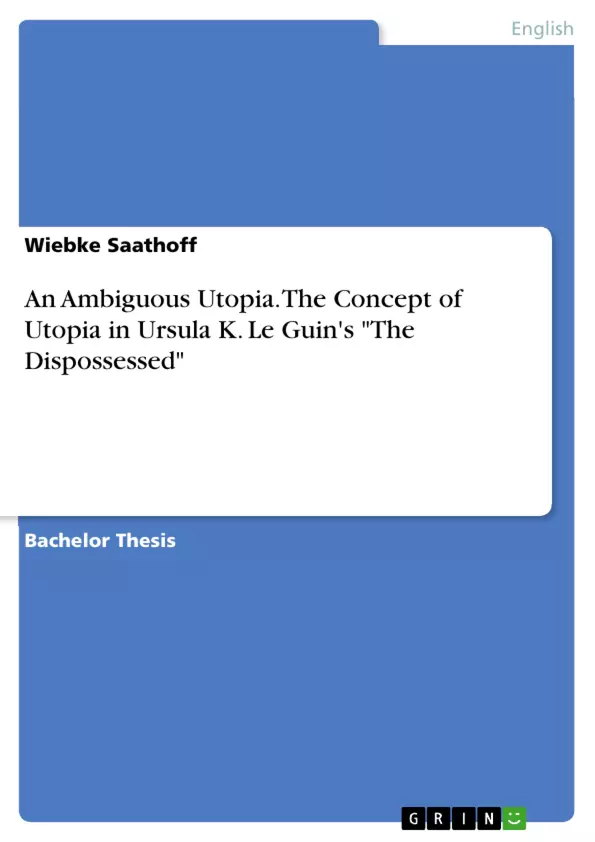Ursula K. Le Guin’s" The Dispossessed: An Ambiguous Utopia" is a science fiction novel from 1974, often conceived as a blueprint for an anarchist society. "The Dispossessed" presents the reader a juxtaposition of Anarres and its sister planet Urras which houses a society based on capitalism. The aim of the present paper is to explore the location of utopia in "The Dispossessed". Is it a utopia as ambiguous as its subtitle declares?
The paper argues that Le Guin's novel in many respects coincides with the concept of a critical utopia. Whereas it is true that both Urras and Anarres display many features that could be considered utopian, "The Dispossessed" equally presents the flaws of its society which, as this paper suggests, relativises their status as the ideal place. The second part of the paper reflects upon the circumstance that both planets are introduced to the reader in the course of a dual narrative, which presents the plotline in alternating chapters on Urras and Anarres. It examines the narrative focus on the protagonist Shevek and his experience of the societies in the light of Tom Moylan's and Ernst Bloch's concepts of utopia. The paper concludes that this ambiguous mode of narration, switching in time and place, firstly portrays a concept of utopia which is dynamic and embedded in historicity and secondly expresses the importance of individual action and initiative for the realisation of utopia.
Inhaltsverzeichnis (Table of Contents)
- Introduction
- State of the Art
- Utopia
- Utopia and Science Fiction
- "Not-Yet": Utopia
- The Dispossessed: An Ambiguous Utopia?
- Anarres
- Urras
- A dynamic Utopia
- Shevek's Utopia
- Past, Present and Future: Journey and Return
- Conclusion
Zielsetzung und Themenschwerpunkte (Objectives and Key Themes)
This paper explores the concept of utopia in Ursula K. Le Guin's science fiction novel The Dispossessed, investigating whether the depicted society on Anarres constitutes a utopia as ambiguous as the title suggests. The analysis draws upon Tom Moylan's theory of the "critical utopia" and Ernst Bloch's concept of "hope" and utopia, examining the novel's presentation of both Anarres and its capitalist counterpart, Urras.
- The nature and ambiguity of utopia in science fiction
- The role of individual action and initiative in achieving utopia
- The dynamic and historical context of utopian ideals
- The juxtaposition of Anarres and Urras as contrasting social models
- The significance of the protagonist, Shevek, and his journey between the two planets
Zusammenfassung der Kapitel (Chapter Summaries)
- Introduction: This chapter introduces the topic of utopia in Ursula K. Le Guin's The Dispossessed and outlines the paper's objectives and approach. It also provides a brief overview of the existing scholarly interpretations of the novel, highlighting various perspectives on the presence and nature of utopia in the text.
- State of the Art: This chapter further explores the diverse scholarly interpretations of The Dispossessed, focusing on the various approaches to understanding the novel's portrayal of an anarchist society and its potential as a utopian model. It examines views ranging from those that see the novel as a blueprint for an anarchist society to those that critique the flaws and limitations of the depicted society on Anarres.
- Utopia: This chapter delves into the concept of utopia, tracing its historical development from Thomas More's seminal work to contemporary interpretations. It introduces Tom Moylan's theory of "critical utopia" and Ernst Bloch's concept of "hope" and utopia, laying the groundwork for analyzing the novel's portrayal of utopia.
Schlüsselwörter (Keywords)
The key terms and concepts explored in this paper include utopia, science fiction, anarchism, critical utopia, hope, individual action, social models, Anarres, Urras, Shevek, The Dispossessed, Ursula K. Le Guin.
Frequently Asked Questions
What is the concept of "Ambiguous Utopia" in Le Guin's novel?
The title suggests that even the anarchist society on Anarres has flaws and limitations, making it a "critical utopia" rather than a perfect place.
How do Anarres and Urras differ?
Anarres is depicted as an anarchist, egalitarian society, while its sister planet Urras is based on capitalism and traditional social hierarchies.
Who is Shevek and why is he important?
Shevek is a physicist who travels between both worlds. His individual initiative and journey are central to the realization of utopian ideals.
What is a "critical utopia"?
Drawing on Tom Moylan's theory, it describes a utopia that remains aware of its own imperfections and is dynamic rather than static.
What role does Ernst Bloch's concept of "hope" play?
The paper uses Bloch's ideas to analyze the "Not-Yet" of utopia—the constant striving toward a better future that is embedded in historicity.
Why does the novel use a dual narrative?
The alternating chapters on Urras and Anarres highlight the juxtaposition of the two social models and portray utopia as a dynamic process.
- Citation du texte
- Wiebke Saathoff (Auteur), 2015, An Ambiguous Utopia. The Concept of Utopia in Ursula K. Le Guin's "The Dispossessed", Munich, GRIN Verlag, https://www.grin.com/document/376963



